This wonderful new article written in the Mojo
Magazine June 2000 issue comes courtesy
of Murphy Anderson.
TIME
TO MAKE A CHANGE
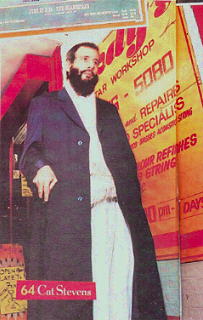
It's
one of music's most overdue reconciliation's.
Yusuf Islam has made peace with Cat Stevens.
By
Colin Irwin
"Just
over there was a small studio where I recorded
my first demo at Regent Sound… and there,
on the corner, that’s where my father
had his restaurant… oh, and there is
a great shop just around this corner…"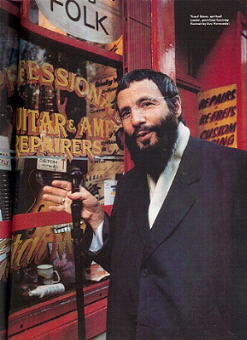
He
looks immaculate. A slim, slightly-built figure,
he strides with brisk purposefulness wielding
a gentleman’s cane. He is polite, formal,
charming and mildly suspicious. It’s
a major shock when he suddenly addresses you
in a voice of conspiratorial matiness and
laddish Cockney.
Yusuf
Islam – the artist formerly known as
Cat Stevens – is 52. Today, on a voyage
of rediscovery around the West End of London
where he was born and raised, he marches through
his old manor with touching boyishness. His
father, a Greek Cypriot, ran the Moulin Rouge
restaurant and is still widely remembered
locally. The proprietor of the nearby upmarket
umbrella shop is delighted when Yusuf unassumingly
introduces himself. "I remember your
father very well. Such a fine man."
"Yes,
thank you," says Yusuf humbly, genuinely
pleased. Yusuf himself remembers being enraptured
by the dazzling array of shows lighting up
theatres all over the area when he was a child.
"My greatest hobby," he says, slightly
embarrassed, "was climbing up on roofs.
I couldn’t believe it when The Drifters
did that song Up On The Roof – it was
as if someone had captured that moment and
put it in a song."
He
was always an outsider. It could scarcely
have been otherwise for the painfully shy
son of a Greek father and a Swedish mother
who went to a Roman Catholic school in Drury
Lane. He credits this unique environment as
the stimulus for the lyrical eccentricity
of early hits like Matthew and Son, I Love
My Dog and I’m Gonna Get Me A Gun –
surreal graphic cameos compared to the likes
of Pet Clark’s This Is My Song and Engelbert’s
Release Me, which were competing for the top
of the charts.
He
was, he admits, "a little weird".
His father had a piano in the restaurant "as
a status symbol" and the teenage Georgiou
turned to music and art as the only means
of expression for his awkward introversion.
He knew from an early age he had to escape.
"Everything about this place was flashing
a message to me, that I didn’t want to
work in the restaurant for the rest of my
life. My father was a wonderful man. He was
very well traveled and spoke 10 languages,
but I always knew I wanted to jump out of
the restaurant. I supposed I used music and
art to launch me."
Living
in the metropolis, he was exposed to all manner
of music and cultures. His sister’s record
collection also introduced him to George Gershwin,
Frank Sinatra and Nat King Cole before a new
world opened up via Buddy Holly and Little
Richard. But it was the thriving folk scene
of the early ‘60’s which helped
to edge music above art in his escape route.
He’d abandoned one-fingered piano after
persuading his father to buy him an 8-pound
acoustic guitar when he was 15 and immediately
started writing songs. He started gigging
during a brief spell at Hammersmith College
of Art. " At first it was mainly in front
of friends. There was a little kebab shop
down the road and there was Les Cousins. I’d
occasionally pick up a guitar there but I
was too shy to play more than one or two songs."
A Greek entrepreneur arranged an audition
with producer Mike Hurst, who once had hits
of his own with The Springfields, and at 17
he was signed to Decca, who were so impressed
that they launched the Deram label –
later home to David Bowie and The Moody Blues
– in his honour. Steven Georgiou was
clued in enough to know that the name had
to go, and came up with Cat Stevens himself.
"I needed a name people wouldn’t
forget. My songs weren’t particularly
commercial but I was very commercially minded."
His
first single was the decidedly curious I Love
My Dog. "I love my dog as much as I lu-huff
yoooo…" with its brooding cello
and dramatic arrangement. Now what was that
all about?
"It
was actually true, that song! Not far from
here I found a little dog, one of those sausage
dogs, tied to a post outside Foyles. No one
was claiming it, so I took the dog home. The
song was about him."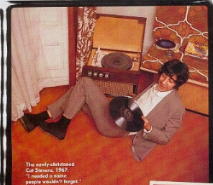
A
massive turntable hit on the pirate stations
Radio Caroline and Radio London which were
revolutionizing our listening habits, it reached
Number 28 in October, 1966 but offered little
clue that it would provide the trigger for
one of the biggest international stars of
the next decade. He wrote Matthew and Son
after seeing a sign in a solicitor’s
window while riding on a London bus. By the
time he reached his stop a whole storyline
had formed in his head about the entire depressing
life of a downtrodden office worker. Only
The Monkees’ I’m A Believer stopped
Matthew and Son topping the charts in the
first weeks of 1967 and Cat Stevens –
now photographed in black velvet Carnaby Street
suits – was ready for anything. A trendy,
good-looking 18-year-old who appeared mean,
moody and a little unhinged and wrote mad
songs, he really couldn’t fail….
"It
was all very exciting," he laughs now.
"Every day there was something new, a
different challenge. I felt I thoroughly deserved
it. I lapped it up."
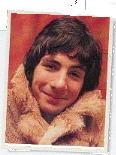 In
fact, he lapped it up a bit too much. By his
own admission he was often unreasonably temperamental
and avidly indulged the many excesses on offer.
He appeared in shows with Georgie Fame and
Marc Bolan ("He was too far out for me
to understand") and went on a package
tour with The Walker Brothers, Engelbert Humperdinck
and Jimi Hendrix. "Actually I got on
well with both Engelbert and Jimi. Jimi was
a very warm and friendly man, a soft-spoken
fellow and a gentle man. It was only when
he got on stage that all hell broke loose.
It was like he was on one of those rapids
– he just couldn’t stop himself.
After the show I’d mostly hang around
with Jimi and we’d go to clubs and discos,
Engelbert wouldn’t go to the same clubs
as us!" In
fact, he lapped it up a bit too much. By his
own admission he was often unreasonably temperamental
and avidly indulged the many excesses on offer.
He appeared in shows with Georgie Fame and
Marc Bolan ("He was too far out for me
to understand") and went on a package
tour with The Walker Brothers, Engelbert Humperdinck
and Jimi Hendrix. "Actually I got on
well with both Engelbert and Jimi. Jimi was
a very warm and friendly man, a soft-spoken
fellow and a gentle man. It was only when
he got on stage that all hell broke loose.
It was like he was on one of those rapids
– he just couldn’t stop himself.
After the show I’d mostly hang around
with Jimi and we’d go to clubs and discos,
Engelbert wouldn’t go to the same clubs
as us!"
Cat
Stevens lived the rock’n’roll cliché.
He drank too much, smoked too much, didn’t
eat properly and couldn’t resist a party.
But he was encountering problems with the
company suits. Already a respected writer
of hits for others (Here Comes My Baby for
The Tremeloes, The First Cut Is The Deepest
for P.P. Arnold) he disowned a violent gun-toting
poster promoting his I’m Gonna Get Me
A Gun single – a song he’d written
as part of a projected musical about his childhood
hero Billy The Kid (I’m Gonna Get Me
A Gun is conspicuous by its absence from the
latest Remember Cat Stevens collection).
Then they suggested it would be a good career
move to go into panto and play Buttons in
Cinderella. "Tommy Steele and Cliff Richard
did that sort of thing then, but I said, No,
that’s the end."
Within
18 months he’d gone from awkward teenager
to wide-eyed pop heart-throb to disillusioned
physical wreck. Early in 1968 he caught a
cold. It turned into a nasty cough. Then he
started coughing up blood. He was rushed to
the hospital and almost died. He had pleurisy.
"Death is the great reminder. There’s
no better way to sober up than to think about
death."
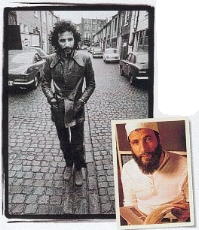 Convalescing in the hospital, his writing took on an
acoustic direction totally at odds with his
previous image. The idea of a washed-up teen
idol trying to make it as a serious songwriter
seemed laughable, but Chris Blackwell had
faith and signed him to Island. He went into
the studio with ex-Yardbird Paul Samwell-Smith
as produce to record his next two albums,
Mona Bone Jakon and Tea for the
Tillerman. "Now I could do it without
the horns and the back-up session men, and
that was so liberating. In the Decca days
I was doing three tracks in a session, but
now I could spend an evening doing one track,
which showed they believed in me. Nobody was
happier than Chris Blackwell when it all started
happening." Convalescing in the hospital, his writing took on an
acoustic direction totally at odds with his
previous image. The idea of a washed-up teen
idol trying to make it as a serious songwriter
seemed laughable, but Chris Blackwell had
faith and signed him to Island. He went into
the studio with ex-Yardbird Paul Samwell-Smith
as produce to record his next two albums,
Mona Bone Jakon and Tea for the
Tillerman. "Now I could do it without
the horns and the back-up session men, and
that was so liberating. In the Decca days
I was doing three tracks in a session, but
now I could spend an evening doing one track,
which showed they believed in me. Nobody was
happier than Chris Blackwell when it all started
happening."
Cat
Stevens, now a reborn singer-songwriter who’d
swapped his old sharp suits for jeans and
T-shirts, became a huge success in America
and had a major hit with the ambitious Lady
D’Arbanville – inspired by his then
girlfriend Patti. He even provided Jimmy Cliff
with an international hit when he covered
Wild World. Peace Train, his deepest and most
telling song to date, gave him a US Top 10.
"America was a whole new experience.
The package they perceived as Cat Stevens
was very different from the UK, which knew
me as the velvet-clad young teenybopper."
Also included on Tea for the Tillerman was
Father and Son, a moving dialogue song that
took on a startling new life when Boyzone
revived it and took it to the top of the charts
in ’95. Yusuf Islam chuckles at the absurdity
of it all. If nothing else it gave him cachet
with his kids: "I wrote Father And Son
in connection with an idea I had about a musical
based on the Russian Revolution: the son was
about to join the Revolution, the father was
a farmer who wanted him to stay at home. I
was in a Turkish restaurant one day and it
came on the radio. One of my children said,
‘Dad, isn’t that your song?’
I said, ‘Why, yes it is!’ It turned
out to be Boyzone. It’s a nice version
and I’m grateful it was a clean-cut group
who did it. I went to meet them at Top Of
The Pops and we had a nice time. They’re
a good bunch of lads."
Tea
for the Tillerman ultimately spent 79
weeks in the US chart, a feat almost repeated
by its successor Teaser and the Firecat,
which included two of his most famous hits
Moon Shadow and Morning Has Broken. Today
he nominates Moon Shadow as his favourite
of the old hits for its lyrical message, while
still somewhat bemused at the way Morning
Has Broken, featuring Rick Wakeman on piano,
had become such an institution. "I found
it in a hymn book. I was looking for inspiration
and went into the religious section in Foyles
down the road and came across the song. But
I’m very surprised it took on such meaning.
It was on of the few songs I didn’t write.
Another Saturday Night was another. And one
they may want to release sometime is my version
of Fats Domino’s Blue Monday – it’s
in the vaults somewhere and they’re trying
to get it out."
By
the time he recorded Catch Bull At Four
in 1972 he was getting more and more spiritual
– the title itself was named after Kakuan’s
Ten Bulls, a 12th century Buddhist
treatise about the steps to self-realization.
The Foreigner album was even more philosophical.
A whole side was devoted to the deeply complex
Foreigner Suite; Stevens himself, meanwhile,
was becoming ever more reclusive.
As
Yusuf describes it now, the great staging
post was another near-death experience in
the mid-‘70’s. "I’d gone
for a swim at my friend Jerry Moss’s
house in Malibu and didn’t realize the
current was so strong. When I tried to swim
back to land I found I wasn’t going anywhere
– just backwards into the ocean. I feared
death again. It was that moment of truth when
we all realize how incredibly weak we are.
I called out to God and the answer came. I
was given a push and the waves suddenly turned
in my favour and I was swimming back. I’d
always believed deep down in God because I
had a private religious side. People often
do have a sense of the sacred but are too
busy with life to give it any credence. It’s
only when they really need it that they call
it up and it’s right there, right on
the surface.
His
brother David returned from Jerusalem with
a copy of the Koran, and from that point Cat
Stevens’ days were numbered. Subsequent
albums Buddha And The Chocolate Box,
Numbers, Izitso and Back
To Earth became increasingly obtuse and,
though they continued to sell to a devoted
fan base, Stevens himself became virtually
invisible, even leaving the UK to live in
Brazil at one point. 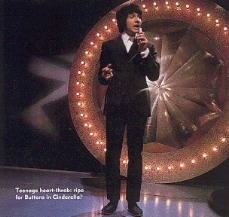
"I
was still going on tour and making music after
I became a Muslim. There’s nothing in
the Koran to forbid music, it’s just
showing off that’s not accepted. God
must be the object of our devotion, but music
isn’t banned. But there is a certain
school of thought which looks upon music and
entertainment as something frivolous, so I
stared to think again. There is music in the
Muslim world but I didn’t make the equation.
I was looking strictly at scripture interpretation,
and it took me a long time to understand the
differences. So I decided to make the break."
In
1979, Cat Stevens ceased to be. He auctioned
off his guitars, gave the money to charity,
changed his name to Yusuf Islam and announced
that his music career was over and that he’d
be dedicating the rest of his life to Islam:
"The only thing I regret was the way
I did it. I was unable to express myself and
perhaps it looked illogical and bizarre. I
was trying to convey the message that this
was what was important to me now and I hoped
it would also be important to people who liked
my music and listened to my words. But I was
so wrapped up in my new life I didn’t
give enough time to try and explain myself.
Perhaps I needed to feel comfortable as a
Muslim. It’s not an easy thing to do.
"Islam
is still looked upon as something alien to
the Western way of life but what I was discovering
was that all the incredible links that make
us human and provide us with optimism and
hope for tomorrow are all in Islam. Explaining
that to someone else is very difficult."
Still
regarded with suspicion by many Westerners,
Yusuf has worked vigorously in his new role.
In 1984 he set up Muslim Aid for famine relief
in Africa; in 1990 he went on a peace mission
to Iraq and successfully returned with four
hostages. He runs an Islamic hotel in Willesden
and is also passionately involved in education
both as a teacher and in setting up schools
for the Muslim underprivileged. One of his
proudest achievements recently has been to
get state aid for one of them. "I was
on my way to Sarajevo when I got the news.
I’d landed in Vienna and they rang and
said, ‘We’ve got it!’ I jumped
into the air."
He
also started recording again. He released
The Life Of The Last Prophet in 1995,
a 65-minute 2-CD mainly spoken word biography
of the Prophet Muhammad, but it took the Bosnian
conflict to shock him into writing and singing
a brand new song, The Little Ones – accompanied
only by drums – featured on the I
Have No Cannons That Roar collection of
Bosnian music dedicated to the children of
Sarajevo and Dunblane. Bosnia’s foreign
minister Irfan Ljubijankic had given Yusuf
a Bosnian song and asked him to "do something
with it". When Ljubijankic was killed
in the war shortly afterwards, Yusuf knew
he must complete the project. He has another
new album, A Is For Allah, just released
on his own Mountain Of Light label, and has
also published a beautiful book of the same
title.
Most
surprising of all, though, is his active involvement
in an ongoing Cat Stevens reissue programme:
"My view of my past has changed since
I embraced Islam. In the early days I wanted
to forget about it and move on. But now I’ve
come to a more balanced view of my music.
There’s good and bad in it, but there
are still some messages and words that are
valid today so I look on the positive side.
"I
received a letter recently from somebody who
said she was on the verge of suicide, but
heard my music and it changed her mind. She
was about to end it all but saw hope through
my songs. That’s good enough for me." |